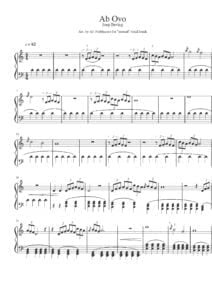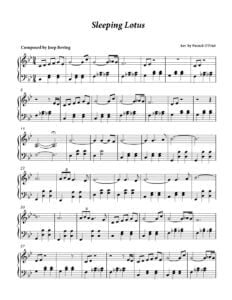Table of Contents:
Joep Beving (sheet music in the #smlpdf)

Best Sheet Music download from our Library.
Joep Beving – Ab Ovo
Joep Beving – Ala
Joep Beving – Midwayer (piano sheet music)
Joep Beving – Sleeping Lotus (Piano solo)
Joep Beving – Sleeping Lotus
Joep Beving – Sonderling
Joep Beving 3 Transcriptions For Piano Solo
Joep Beving Etude
Joep Beving Solitude
Joep Beving The Light She Brings
Joep Beving Zoetrope
Please, subscribe to our Library. Thank you!

Joep Beving – Ab Ovo
Contemporary Dutch composer and pianist Joep Beving creates genuinely relaxing and contemplative neo-classical music with a broad and immediate appeal. Joep Beving describes it as “simple music for complex emotions”.

Best Sheet Music download from our Library.
Who is Joep Beving?

Short Biography
They say you need three things to succeed in the music business – talent, timing and luck. Plus a little something extra to get you noticed. Joep Beving has all four in abundance.
At nearly six foot ten, with his wild hair and flowing beard, the Dutch pianist resembles a friendly giant from a book of children’s fairy tales. But his playing – understated, haunting, melancholic – marks him out as the gentlest of giants, his delicate melodies soothing the soul in these troubled times.
“The world is a hectic place right now,” says Joep. “I feel a deep urge to reconnect on a basic human level with people in general. Music as our universal language has the power to unite. Regardless of our cultural differences I believe we have an innate understanding of what it means to be human. We have our goosebumps to show for it.”
Joep’s music is the antidote to that hectic world of uncertainty and fear – a soundtrack for a kinder, more hopeful future; a score for the unmade film of lives yet to come. “It’s pretty emotional stuff,” agrees Joep. “I call it ‘simple music for complex emotions’. It’s music that enhances images, music that creates a space for the audience to fill in the gaps with their own imagination.”
As for the rest of Joep Beving’s story, it’s one of good fortune and better timing.
Joep (pronounced “Yoop”) first formed a band at 14 and made his live debut in his local town’s jazz festival. He left school torn between a life in music and a career in government. When a wrist injury forced him to abandon his piano studies at the Conservatoire and focus on an Economics degree, it seemed that music’s loss would be the Civil Service’s gain.
But the draw of music was too strong. “It was always in my heart,” he says, “and it always will be.” Reaching a compromise between his two conflicting paths, he spent a decade working for a successful company matching and making music for brands. “But I always had a love-hate relationship with advertising – I was never comfortable using music to sell people stuff they don’t need”.
In his spare time he played keyboards with successful Dutch nu-jazz outfit The Scallymatic Orchestra and self-styled “electrosoulhopjazz collective” Moody Allen, and dabbled in electronica with his one-man project I Are Giant. But, by his own admission: “It was not me. I had not found my own voice”.
That began to change during a trip to Cannes for the Lions Festival – the Oscars of the advertising world – when he played one of his compositions at the grand piano at his hotel… and people started to cry. “It was the first time I had seen the emotional effect my music could have on an audience.”
Encouraged by the response, Joep organised a dinner party for close friends at his home in Amsterdam, where he played them his music on the piano left to him by his late grandmother in 2009. “It was the first time my friends had heard me play music they thought should travel outside my living room. It was the push to pursue the dream of doing a solo album with just my instrument.”
A month later a close friend died unexpectedly, and Joep composed a piece for his funeral service. “I performed it for the first time at his cremation. Afterwards people encouraged me to record it so that it would be a permanent memorial to him. He was an extraordinary person.”
Inspired by the reaction, Joep wrote more tunes and recorded them in single takes over the course of the next three months in his own kitchen, playing in the still of night while his girlfriend and two young daughters were asleep. The result was his debut album Solipsism.
Turned down by the only record label he had approached, he paid to press 1,500 vinyl copies, with artwork by Rahi Rezvani (who also made the stunning video for “The Light She Brings”). Joep staged the album launch in March 2015, in the studio of hot Amsterdam fashion designer Hans Ubbink, and performed it there for the first time.
That first vinyl pressing quickly sold out, mainly to friends, and the songs were an instant hit on Spotify, whose team in New York added one tune – “The Light She Brings” – to a popular ‘Peaceful Piano’ playlist. “People started saving the tune, so they put another one on. Then they started liking the whole of my album.” Soon Solipsism was a viral phenomenon, with another tune, “Sleeping Lotus”, now over 30 million streamed plays. And all songs of both albums together have now been streamed over 180 million times.
As a result of his huge online success, Joep was invited to perform on a prime-time Dutch TV show. The following day his album knocked One Direction off the top of the charts. “Then, a few days later, Adele made her comeback – and I was history,” he laughs. But by then he had made his mark.
He was besieged by concert promoters offering shows, including a prestigious solo recital at Amsterdam’s famous Concertgebouw, and his album found its way to Berlin when another friend played it in her local bar, “at 2am with everyone smoking and drinking Moscow Mules.” By chance, one of those night owls was Deutsche Grammophon executive Christian Badzura. After making contact online, they met when Joep Beving performed at Berlin’s Christophori Piano Salon – and ended up signing with the world’s foremost classical label.
The first fruits of the new partnership are Prehension. A natural successor to Solipsism, it carries forward the musical and philosophical themes Joep identifies in his music. “I am reacting to the absolute grotesqueness of the things that are happening around us, in which you feel so insignificant and powerless that you alienate yourself from reality and the people around you because it is so impossible to grasp. I just write what I think is beautiful, leaving out a lot of notes, telling a story through my instrument, trying to unite us with something simple, honest and beautiful.”
JOEP BEVING – the Dutch composer and pianist whose music, streamed many hundreds of millions of times, is as instantly recognisable as his 6’10” frame –has confirmed details of the ZERO EP, which will be released by Deutsche Grammophon on 14 July 2021 at 20:00 CET. It offers four brand-new remixes of “Hanging D” – taken from his second album, 2017’s Prehension – by Max Cooper, Polynation, Afrodeutsche and Alva Noto. For the occasion Cooper has teamed up with Polish artist Ksawery Komputery to provide a video to accompany his interpretation. In addition, each track is accompanied by artwork by award-winning Australian artist and designer Jonathan Zawada, who has consolidated the four images for the main EP cover.
As with “Hanging D” itself, named for the note that Beving plays persistently throughout, the EP’s title, ZERO, is also significant. A reference to the piece’s cyclical nature, it contains an “O” – as do Zawada’s artwork and the names of each artist – and is reflective of the manner in which the choice of start and end for “Hanging D” ultimately has little impact. Additionally, the title invokes the composition’s multiple manifestations so far: as well as the original version, a rework by Colin Benders and an arrangement for eight cellos by the Amsterdam Cello Octet were included on 2018’s Conatus remix album. These latter two remixes will also be included on ZERO alongside the four new remixes, each an innovative reincarnation breathing yet more life into the piece.
Speaking of the EP, Beving says, “This piece is very dear to me, and I remember when I wrote it. Most of the pieces I had written up to that point were soft and understated. I was looking for a way to channel the other side of the emotional coin, something with energy and intensity. While playing, it felt like a vortex appeared, engulfing me as a player, and it’s still one of my favourite pieces to play. The resonance of the piano and the interplay of all the frequencies is just magical. I’m very excited that we get to share new and amazing interpretations, and my hope is its transformative energy will find new ears outside our genre.”
The EP’s opener is by renowned London-based electronica musician Max Cooper, whose work also explores visual art, technology and science, and who refers to his pulsing, dramatic adaptation as “one of the most enjoyable remixes I’ve ever worked on”. Elaborating on the experience, he says, “I changed the rules of remixing for this project, and instead of using audio from the original piece, I imagined what could happen if Joep was in my studio playing my synths instead of his piano. Each piano note was converted to synth notes and then I set about becoming an orchestrator. It was nice to discover that hiding in there, in his beautiful stripped-back piano piece, was a synth epic crying out for hugeness. The whole thing turned into a contrasting range of emotions, from defeat to victory, with the idealism of screaming Prophet and Moog oscillators hard panned for maximum width.”
Cooper also proposed a video. “I wanted to find something similarly reduced and built on contrasts, so started chatting with the algorithmic artist Ksawery Komputery. Ksawery had the great idea of linking the constant flow of the musical structure with a constant flow of particles, which would tell a story via fleeting moments of image formation.” The result is suitably hypnotic.
“‘Hanging D’ puts me in a deeply nostalgic mood,” explains the graphic designer, animator and programmer, also known as Ksawery Kirklewski, of the inspiration for his imagery. “The dense ticking calls to mind passing time, while the strong piano chords point to the different stages of life. The track reminds me of my phone’s gallery, filled with tons of memories and growing every day. It’s a completely new situation in history, since our great-grandfathers left us with just a few blurry photographs. The data we generate will remain as a substantial historical archive for future generations. It will grant posterity the chance to travel in time, browsing fast backwards through our lives. Inspired by the track, I focused on this idea of ‘data excavation’ and attempted to visualise the feeling of this process.”
“I create my videos mostly through coding,” he adds. “This time I wanted to build the scenes with rows of timelines, consisting of simple shapes (‘pixels’) occurring as life events, constantly passing the screen to the left. I used my own pictures and movies that I felt were important to me (like Krzysztof Kieślowski’s Talking Heads, 1980) The retro stylistic also fitted here for me, so I created the colour palettes out of old computer games. The algorithmic transitions between the scenes refer to the progress of image/video processing techniques such as dithering, interlacing, caching, buffering, compression or noise reduction. In my work I’m interested in low-resolution effects and exploring the limits of legibility.”
Additionally, Amsterdam-based Polynation – producer duo Stijn Hosman and Hessel Stuut, who work across the peripheries of dance, ambient music, minimalism and IDM – have lent the piece an irresistible downtempo groove which ebbs and flows over the course of its nearly seven minutes. “Although it’s minimalistic, the original piece has lots of interesting twists and turns and we wanted to emphasise them,” they observe. “In order to do this we deconstructed the harmony and melodies and played them out over various synths, muted piano strings and other instruments to create bigger contrasts. Being able to start with the cello octet version of the track gave us lots of beautiful textural layers to work with. When combining the different elements we created with the strings it reminded us of a seventies disco vibe, which inspired us to record acoustic drums to give the piece more drive and dynamics. It was a true pleasure to work on this remix – it ended up being quite a complex puzzle which magically came together.”
Meanwhile, British-born Ghanaian / Russian / German composer, producer and DJ Afrodeutsche, currently based in Manchester, turns in a grand, percussive interpretation swathed in ethereal vocals and strings. “This remix was a wonderful opportunity for me to orchestrate layer upon layer of strings to a very ‘keys and rhythm’-led piece,” she says. “My vocals play a huge part, and I was stepping out into avenues I hadn’t had the confidence to venture out into and explore in the past. You could say that this remix helped me find my voice! It was a joy to combine my electronic and contemporary music production points of view through a piece that was already so moving to me. The introduction of organs, granular synthesis and vocals seemed to create an otherworldliness to the piece which I love. I have to confess, this piece quickly became a track I play on repeat.”
The package is rounded out by Berlin-based Alva Noto, aka Carsten Nicolai, who runs the NOTON label and, alongside Ryuichi Sakamoto and Bryce Dessner, helped compose the score for the Academy Award- and Golden Globe-winning The Revenant. His “remodel” reduces the piece to its muted, minimalist essence, with the eponymous “hanging D” nonetheless insistent throughout its atmospheric six-minute lifespan.
Joep Beving, a sensation of the contemporary classical streaming world, returns to his solo piano roots with Hermetism. The Dutch composer/pianist’s fourth album for Deutsche Grammophon will be released globally on 8 April 2022. Inspired by ancient philosophy, Beving’s latest project is an album in search of universal ideas. “I hope that it will have a comforting and communal effect on listeners,” says the artist. Written during the dark days of the pandemic, in an age of fear and polarisation, Hermetism blends poignant melancholy with an offer of hope, spanning twelve new tracks recorded on Beving’s cherished Schimmel piano.
Beving has used music to explore some of life’s big philosophical questions in three hugely successful albums – Solipsism, Prehension and Henosis. After his trilogy for Deutsche Grammophon, he was left with a question: what next? The answer eluded him at first, so he turned to composing for a Dutch film and stage play. Yet ideas that had been brewing for years began to take shape. “I came back to the piano to feel at home and in tune with myself and my surroundings,” notes Beving. “I wanted to go by what felt right, which was to go back to the beginning, to solo piano songs, but using everything I had learned during the making of the trilogy.”
For his latest project, he draws on Hermetism, a spiritual philosophy which stems from ancient writings attributed to the legendary Greek author Hermes Trismegistus. At its core are seven universal laws of nature, passed down through the centuries and later compiled in The Kybalion, a text that has influenced New Age theories in more recent times. These concepts – such as the principle of cause and effect and the principle of rhythm – are all about finding a continuous balance in life and existence. “The teachings around these principles feel so truthful to me and I hope they will inspire others,” says Beving.
Much of the music on Hermetism is shaped by his readings on these ideas. The poignant “Last Dance”, for example, picks up on the principle of rhythm: what goes up must come down. “The music has a spiralling, circling nature. It’s as if something is falling and then it gets picked up again, and it could go on like that forever. That image really fits within the concept of Hermetism,” reflects Beving. “I got drawn back to this music almost like a mantra.” Another stand-out is the yearning, Middle Eastern- inspired “Dervish”. “I have a fascination for the life and works of George Gurdjieff that I believe has influenced my thinking and also my music to a certain extent. It became more prominent in the writing of this piece.” The contemplative “Nocturnal” is set to be the first single to be shared with the world.
In a rare move for Beving, he also had in mind a particular place when he was writing Hermetism. “I had a romantic idea of a past time where someone in Paris would be dedicating their life to the quest for beauty,” he says. “You walk the streets, and there’s an open window with someone playing the piano inside. I had that in mind but overshadowed by dark skies. Some terrible things have happened in Paris in the past few years. I took Paris as a metaphor for Western civilisation.” From the absinthe-inspired opening track “La fée verte” to “Paris s’enflamme”, named after a song by Ladyhawke, nods to the French capital infuse the album.
After self-releasing his debut album Solipsism in 2015, Beving became a viral streaming sensation. His music has since been streamed over half a billion times, and he has performed sold-out shows around the globe. Ultimately, he hopes that Hermetism will resonate on a deep level with his listeners. “In all the madness of recent times, this album has been the thing I’ve kept coming back to,” he explains. “In that sense Hermetism has been my own medicine for the pandemic.”
